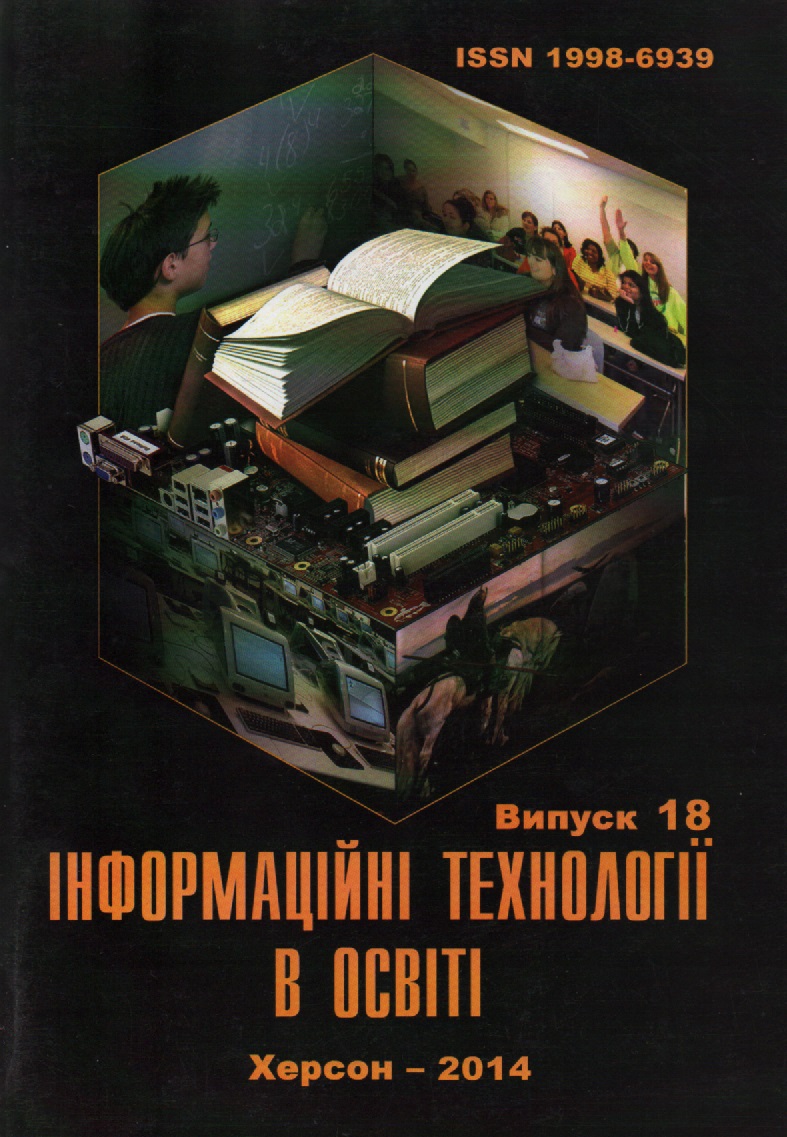DIPLOMA PROJECT TEAM WORK MANAGEMENT
DOI:
https://doi.org/10.14308/ite000471Keywords:
communication, development management, diploma project, IT competences, project, team work managementAbstract
During the work performance students should get the maximal approach to the process of real project execution, so the project should include the need to use the latest technology, integration of data or services with different developments, architecture design, interaction of the team members and others.
Implementation of graduation projects is the useful activity for the acquisition and consolidation of key IT competencies. Since the task of educational projects is maximal close to real one, students participate almost in all typical stages of commercial product’s development, and do so successfully. This is also confirmed practically: students, who were actively engaged in some projects at the university, have key positions in IT companies of the city and country after that.
The main objective of the paper is to describe the organization of a common group students’ work on a degree project, implementation peculiarity of such projects, recommendations for improving the quality of projects. Thus, the paper is devoted to the peculiarities of the joint students’ work on a project during diploma execution in IT specialties, as the final part of the acquisition and consolidation process of key IT competencies of future programmers. The problem of choosing work topic, project concept, work organization in a group, implementation process organization has been considered. Also the specific stages of software development have been considered: development of interface, choice of technology, product quality, project disposal to the next developers, project completion.
Downloads
Metrics
References
1. Акіменко В. В. Особливості розробки освітнього стандарту з інформатики (напрям підготовки 040302) / Акіменко В. В., Нікітченко М. С. // Інформаційні технології в освіті : збірник наук. праць. – Вип. 5. – Херсон : Видавництво ХДУ, 2010. – С. 9–15.
2. Гришко Л. В. Вимоги до професійних якостей програміста / Л. В. Гришко // Вісник Черкаського університету. – Вип. 173. Серія: Прикладна математика. Інформатика. – Черкаси, 2009. – С. 116–120.
3. Галузевий стандарт вищої освіти України. Освітньо-кваліфікаційна характеристика бакалавр. Галузь знань 0403 Системні науки та кібернетика. Напрям підготовки 040302 Інформатика. Міністерство освіти і науки України. – К., 2010. – 32 с.
4. Галузевий стандарт вищої освіти України. Освітньо-професійна програма підготовки бакалавр. Галузь знань 0403 Системні науки та кібернетика. Напрям підготовки 040302 Інформатика. Міністерство освіти і науки України. – К., 2010. – 94 с.
5. Національний класифікатор України - класифікатор професій ДК 003 - 2005. К.: Соцінформ, 2006,- 616 с.
6. Національний класифікатор України - класифікатор професій ДК 003 - 2005. Зміни № 1-№ 2 у 2007 р. К.: Соцінформ, 2007. - 80 с.
7. Семеріков С. О. Фундаменталізація навчання інформатичних дисциплін у вищій школі : монографія / наук. ред. М. І. Жалдак. – Кривий Ріг : Мінерал; К. : НПУ ім. М. П. Драгоманова, 2009. – С. 55–56.
8. Співаковський О. В. Теорія і практика використання інформаційних технологій у процесі підготовки студентів математичних спеціальностей / Співаковський О. В. – Херсон : Айлант, 2003. – 229 с.
9. Психология программирования. Групповая разработка и организация коллектива [Электронный ресурс] // Материалы лекции из курса «Введение в технологию программирования» / Терехов А. Н. – Режим доступа к материалу : http://citforum.univ.kiev.ua/SE/project/terehov/2.shtml.
10. Співаковський О.В. Шляхи удосконалення курсу “Основи алгоритмізації та програмування” у педагогічному вузі. - Співаковський О.В., Львов М.С. - Комп’ютер у школі та сім’ї. – 2001. - №4. - С.22 - 24.
</uk>
<en>
1. AkImenko V. V. OsoblivostI rozrobki osvItnogo standartu z Informatiki (napryam pIdgotovki 040302) / AkImenko V. V., NIkItchenko M. S. // InformatsIynI tehnologIYi v osvItI : zbIrnik nauk. prats. – Vip. 5. – Herson : Vidavnitstvo HDU, 2010. – S. 9–15.
2. Grishko L. V. Vimogi do profesIynih yakostey programIsta / L. V. Grishko // VIsnik Cherkaskogo unIversitetu. – Vip. 173. SerIya: Prikladna matematika. Informatika. – Cherkasi, 2009. – S. 116–120.
3. Galuzeviy standart vischoYi osvIti UkraYini. OsvItno-kvalIfIkatsIyna harakteristika bakalavr. Galuz znan 0403 SistemnI nauki ta kIbernetika. Napryam pIdgotovki 040302 Informatika. MInIsterstvo osvIti I nauki UkraYini. – K., 2010. – 32 s.
4. Galuzeviy standart vischoYi osvIti UkraYini. OsvItno-profesIyna programa pIdgotovki bakalavr. Galuz znan 0403 SistemnI nauki ta kIbernetika. Napryam pIdgotovki 040302 Informatika. MInIsterstvo osvIti I nauki UkraYini. – K., 2010. – 94 s.
5. NatsIonalniy klasifIkator UkraYini - klasifIkator profesIy DK 003 - 2005. K.: SotsInform, 2006,- 616 s.
6. NatsIonalniy klasifIkator UkraYini - klasifIkator profesIy DK 003 - 2005. ZmIni # 1-# 2 u 2007 r. K.: SotsInform, 2007. - 80 s.
7. SemerIkov S. O. FundamentalIzatsIya navchannya Informatichnih distsiplIn u vischIy shkolI : monografIya / nauk. red. M. I. Zhaldak. – Kriviy RIg : MIneral; K. : NPU Im. M. P. Dragomanova, 2009. – S. 55–56.
8. SpIvakovskiy O. V. TeorIya I praktika vikoristannya InformatsIynih tehnologIy u protsesI pIdgotovki studentIv matematichnih spetsIalnostey / SpIvakovskiy O. V. – Herson : Aylant, 2003. – 229 s.
9. Psihologiya programmirovaniya. Gruppovaya razrabotka i organizatsiya kollektiva [Elektronnyiy resurs] // Materialyi lektsii iz kursa «Vvedenie v tehnologiyu programmirovaniya» / Terehov A. N. – Rezhim dostupa k materialu : http://citforum.univ.kiev.ua/SE/project/terehov/2.shtml.
10. SpIvakovskiy O.V. Shlyahi udoskonalennya kursu “Osnovi algoritmIzatsIYi ta programuvannya” u pedagogIchnomu vuzI. - SpIvakovskiy O.V., Lvov M.S. - Komp’yuter u shkolI ta sIm’Yi. – 2001. - #4. - S.22 - 24.
</en>
Downloads
Published
How to Cite
Issue
Section
License
This work is licensed under a Creative Commons Attribution-NonCommercial-ShareAlike 4.0 International License.






























